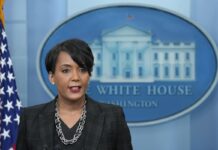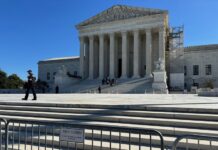
(GA Recorder) — If you’re voting in person this November, remember to bring your own snacks.
A federal judge in Atlanta Thursday upheld a provision in Georgia’s 2021 election overhaul forbidding people from handing out water, food and other gifts to people standing in line to vote, also known as line warming or line relief. But he left room for a future challenge.
Georgians are banned from handing out items both in what is referred to as the “buffer zone,” 150 feet from the edge of the polling place, and the “supplemental zone,” 25 feet away from any voter in line.
United States District Judge J.P. Boulee found that enforcing the ban within 150 feet of the polling precinct is legally appropriate, but forbidding handouts within the supplemental zone could amount to an unreasonable restriction on free speech.
“Because that zone is tied to the position of the voter in line and fluctuates based on the location of the voter, it has no fixed line of demarcation and no limit,” Boulee wrote. “In practice, the Supplemental Zone could easily extend thousands of feet away from the polling station (and across private property) given the documented hours-long lines that voters at some polling locations have experienced.”
Restricting speech within a theoretically limitless distance of the polls would likely not pass constitutional muster, Boulee concluded.
Still, the judge refused to put a hold on the law with a major election only months away, ruling that doing so would require new training for poll workers and could confuse voters by requiring a different set of rules than what was applicable during the May primary elections.
The ruling was a disappointment to the civic organizations that challenged the provision, including the Sixth District of the American Methodist Episcopal Church, Delta Sigma Theta Sorority, Georgia Muslim Voter Project and the Latino Community Fund of Georgia.
The organizations said they provided food and water as well as items like folding chairs, umbrellas and fans to encourage people to persevere when lines get long.
The AME Church testified that line warming has a background in the Civil Rights movement and that long lines have disproportionately afflicted Black precincts. Church leaders say giving out food is protected speech and a way for congregants to live according to the gospels.
“Line relief allows voters waiting in long lines to get some respite from having to wait in long lines—whether it is through a bottle of cold water or a chair to rest weary legs,” wrote Bishop Reginald Jackson in a court filing. “By providing line relief, our members send the message to voters that they have dignity as voters, their voice matters, and that they should overcome barriers to political participation by staying in line and ensuring that future elections are not marred by obstacles to the ballot box (such as long lines).”
Ryan Germany, general counsel for Secretary of State Brad Raffensperger’s office testified about complaints they received charging that some groups posing as non-partisan may have been trying to encourage people to vote a certain way.
He argued that in many cases, the simple act of handing out a bottle of water had been replaced by sophisticated operations. Blocking the law would have meant forcing poll workers to police these actions.
“County elections officials would also be forced to spend more time and resources policing activity in and around voters waiting in line to ensure it is not campaigning, electioneering, or giving anything of value to vote,” he wrote in a filing. “This would be time-consuming and problematic.”
Lawyers for the civic groups pledged to continue to challenge the ban of line warming and numerous other aspects of the voting law, including the time period to request and cast an absentee ballot, early voting dates and widespread use of ballot drop boxes.
The fight against Georgia’s anti-voter law is far from over,” said Rahul Garabadu, voting rights staff attorney with the ACLU of Georgia. “While Georgia’s cruel ban on line relief stands for now, we look forward to presenting our broader case against SB 202 at trial, where we will prove that many provisions in the legislation violate federal law and the Constitution.”







